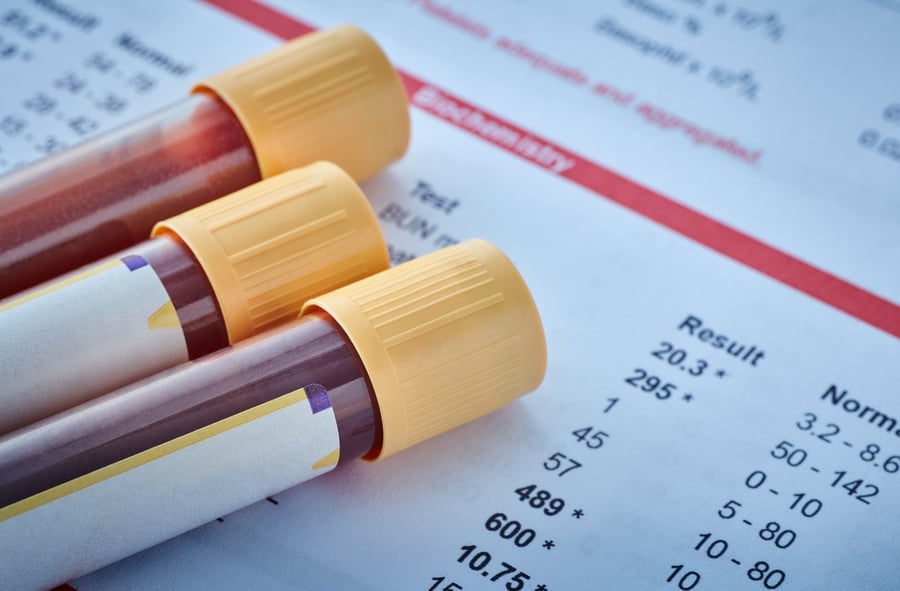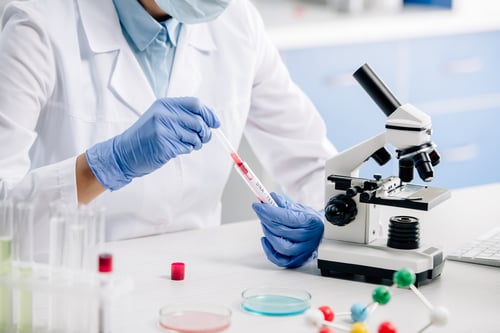

10 of the Most Common Type of Blood Tests
Blood tests are one of the most common, and useful, procedures that healthcare providers use to monitor our health.
“A blood test is a lab analysis of things that may be found in your blood. You may have blood tests to keep track of how well you are managing a condition such as diabetes or high cholesterol. You may also have them for routine checkups or when you are ill,” says Johns Hopkins Medicine.
Just a small amount of blood drawn can help your doctor check your well-being for a wide range of issues.
“From checking your cholesterol levels and thyroid function to diagnosing infections, diseases and other conditions, blood tests are often the first step in diagnosing dozens of conditions,” says Fatma Deif, MD, an internal medicine physician at Scripps Clinic Rancho San Diego.
Routine Blood Tests: Safe and Quick
Some 14 billion laboratory tests are ordered annually across approximately 260,000 CLIA-certified labs in the U.S. with blood tests being one of the most common tests.
The global blood testing market is forecasted to grow at an annual rate of 8.3 percent per year through 2028, spurred on by the coronavirus pandemic.
Routine blood tests are safe and quick with a phlebotomist using a needle to take a sample, typically from a vein in your arm.
The tests are not painful with patients experiencing a small prick in their arm as the needle is inserted. The procedure lasts just a few minutes.
“For most kinds of blood tests, you don't need to prepare. These tests are to see what your blood is like under normal conditions,” says Johns Hopkins Medicine. “For some blood tests, you will have to not eat (fast) for a certain amount of time before the blood test. This usually means no eating or drinking anything after midnight before the test. These tests are often scheduled for early in the morning. Your healthcare provider will let you know if you need to fast before a blood test.”
Common Reasons Why a Blood Test is Ordered
“Blood tests are very common. They help doctors check for certain diseases and conditions. They also help check the function of your organs and show how well treatments are working,” says the National Heart, Lung, and Blood Institute.
Johns Hopkins says that healthcare providers may order a blood test for a variety of reasons including to:
- Find out how well organs such as your kidneys, liver, heart, or thyroid are working.
- Help diagnose diseases such as cancer, diabetes, coronary heart disease, and HIV/AIDS.
- Find out if your medicine is working to make you better.
- Diagnose bleeding or clotting disorders.
- Find out if your immune system is having problems fighting infections.
- Diagnose anemia, such as iron-deficiency anemia, pernicious anemia, aplastic anemia, or hemolytic anemia.
- Find variations in hemoglobin such as hemoglobin S, C, or E, which are common in people of African, Mediterranean, or Southeast Asian background.
- Monitor chronic health conditions and diseases.
- Find health problems in their early stages.
Most test results are returned within 24 hours with CMP taking up to 72 hours in some cases.
Patients have a right to know and understand why a blood test has been ordered by their provider so they need to have a discussion with their doctor before taking the blood test.
Types of Blood Tests You Might Take
There are many different types of blood tests that you can take. Healthline outlined 10 of the most common that are ordered:
- Complete Blood Count (CBC): You no doubt have heard the term CBC thrown around on television or streaming shows set in hospitals. A CBC checks for 10 different components of every major cell in your blood including:
o Red blood cell levels (normal range: adult men 5 to 6 million cells/mcL; adult women 4 to 5 million cells/mcL)
o White blood cell levels (normal range: 4,500 to 10,000 cells/mcL)
o Platelet levels (Normal range: 140,000 to 450,000 cells/mcL)
o Hemoglobin levels (Normal range: adult men 14 to 17 gm/dL; adult women 12 to 15 gm/dL)
o Hematocrit levels (Normal range: adult men 41 to 50 percent; adult women 36 to 44 percent)
o Mean corpuscular volume (MCV) levels (Adult range: 0 to 95 femtoliter)
- Basic Metabolic Panel (BMP): A BMP checks your blood for eight compounds:
o Bicarbonate
o Blood urea nitrogen (BUN)
o Calcium
o Chloride
o Creatinine
o Glucose
o Potassium
o Sodium
- Comprehensive Metabolic Panel (CMP): A CMP tests for the components included in a BMP plus additional proteins and substances related to liver function such as:
o Alanine aminotransferase (ALT)
o Albumin
o Alkaline phosphatase (ALP)
o Aspartate aminotransferase (AST)
o Bilirubin
o Total protein
- Lipid Panel: These tests check two types of cholesterol:
o High-density lipoprotein (HDL) or so-called “good cholesterol”
o Low-density lipoprotein (LDL) or so-called "bad cholesterol”
o Total cholesterol
o Triglycerides
- Thyroid Panel: This panel monitors how well your thyroid is producing and reacting to certain hormones by looking at:
o Thyroid-stimulating hormone (TSH) (Normal result 0.5 to 4 mlU/L)
o Thyroxine (T4) (Normal result: 0.8 to 1.8 ng/dL adults)
o Triiodothyronine (T3) (Normal result: 80 to 180 ng/dL)
- Cardiac Biomarkers: Tests for common enzymes such as:
o Creatine kinase (CK) (Normal range: 30 to 200 U/L)
o Creatine kinase-MB (CK-MB) (Normal range: 0-12 U/L)
o Troponin (Normal range: less than 1 ng/mL)
- Sexually Transmitted Infection (STI) Tests: STIs that can be diagnosed via blood test include:
o Chlamydia
o Herpes
o Gonorrhea
o HIV
o Syphilis
- Coagulation Panel: This panel measures how well your blood clots and how long it takes for your blood to clot. Results are often used to diagnose conditions such as:
o Excessive bleeding (hemophilia)
o Leukemia
o Liver conditions
o Thrombosis
o Vitamin K deficiency
- DHEA-Sulfates Serum Test: This test measures if your dehydroepiandrosterone (DHEA) hormone levels are too high or low. Low levels can be caused by:
o Addison’s disease
o Adrenal dysfunction
o Hypopituitarism
While high levels can be associated with:
o Benign or malignant tumor on the adrenal gland
o Congenital adrenal hyperplasia
o Ovarian tumor
o Polycystic ovary syndrome (PCOS)
- C-Reactive Protein (CRP) Test: CRP is produced by your liver when tissues in your body are inflamed. High levels could indicate:
o Autoimmune diseases, such as Lupus or rheumatoid arthritis
o Bacterial or viral infections
o Cancer
o Inflammation related to diabetes
o Inflammation related to physical trauma or from habits like smoking
Subscribe to email updates
Related Articles

Topics

Topics

Topics



